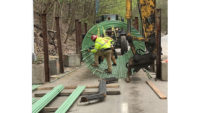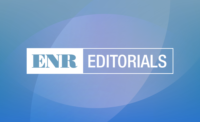NTSB Decides Not to Hold Hearing on Bridge Collapse
Reactions are mixed to the National Transportation Safety Board's decision not to hold a public investigative hearing on last August's Minneapolis bridge collapse. House Transportation and Infrastructure Committee Chairman James Oberstar (D-Minn.) has blasted the decision and says such a hearing would be valuable. According to published reports, Minnesota's U.S. Senators are divided on the issue, with Norm Coleman [R] saying he supports the board's decision and Amy Klobuchar (D) saying a hearing should be held.
In releasing several reports March 17 on the bridge accident, NTSB Chairman Mark V. Rosenker said the safety board had agreed with recommendations by its investigative staff not to have an interim investigative hearing. The board's vote was 3-2, says Terry Williams, a safety board spokesman.
Williams adds that the board often doesn't have such hearings before its meetings to decide on accidents' probable causes. It held no interim hearings in 2007, he says. Rosenker said that "barring unexpected developments" a final report on the I-35W collapse, with a finding of the accident's probable cause, is likely to be ready for board consideration by the end of 2008.
But in a March 19 letter to Rosenker, Oberstar said he disagreed with the board's decision. He said that "this is the first major bridge collapse in many years, and it has raised national concerns about bridge safety, particularly of bridges of the same class as I-35W." He also said he was "highly concerned" that Rosenker didn't tell him that the decision wasn't unanimous and that two board members had issued a dissent.
Those two board members who voted to hold a hearing, Deborah A.P. Hersman and Kathryn O'Leary Higgins, said in their dissent, "A focused public hearing may uncover significant useful information not only for the board but also for the transportation community as a whole."
Hersman and O'Leary also said, "We recognize that a political debate is raging in Minnesota about the maintenance this particular bridge received in its 40-year history," but the added that "the very fact that the [political] debate is taking place presents an even more compelling reason to have a public hearing and provide enough transparency to assure the public that our independent investigation transcends local arguments and politics."






